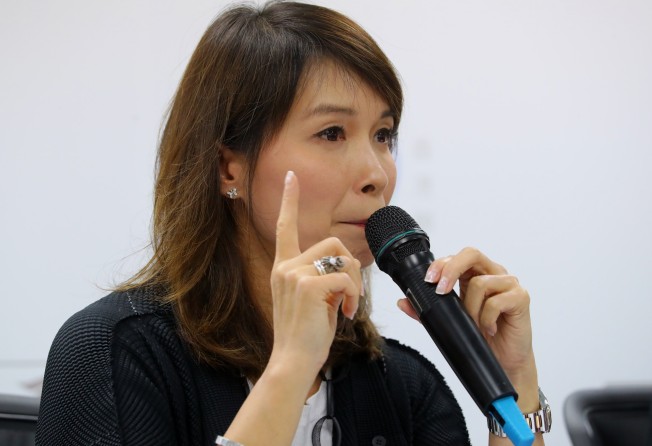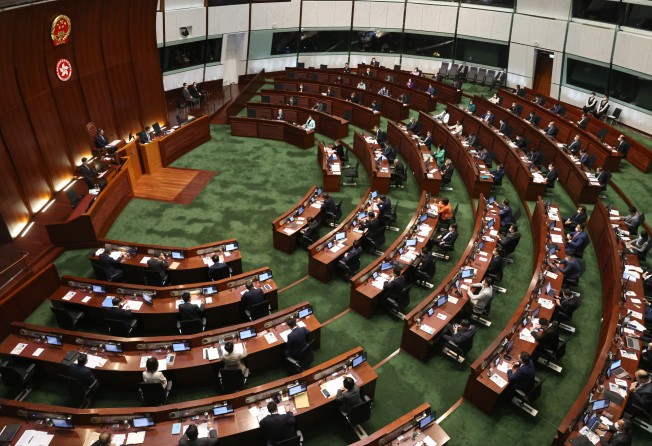
Only ‘patriots’ in the house: no more fireworks at Hong Kong legislature, but lawmakers say they’re doing their job
- Despite absence of opposition, lawmakers insist they ask questions and legislature is no rubber stamp
- New Legco’s first 12 months have been peaceful, with no noisy protests or filibustering like in the past

Completing her first year as a member of Hong Kong’s Legislative Council, outspoken lawmaker Doreen Kong Yuk-foon said: “Being patriots does not mean we have to be yes-men.”
Dubbed “naughty girl” by some, the lawyer has made her mark by offering alternative, if not opposing, views on government policies.
In September, she questioned the legal basis for the government’s decision to invalidate more than 20,000 certificates exempting people from getting their Covid-19 vaccinations on suspicion that some private doctors had issued them without proper consultations.
That led to a legal challenge, at the end of which the High Court quashed the government’s move, saying it had no power to do so.

Kong made headlines again recently after criticising the government for not scrapping the vaccine pass system despite the receding Covid-19 pandemic.
She questioned if banning those not fully vaccinated from dining in at restaurants or going to indoor sports venues could be a breach of the Basic Law, the city’s mini-constitution, which guaranteed Hongkongers’ rights and freedoms.
“Some people may think I am high profile. I don’t do it for the sake of getting media attention. But I do not think I am fulfilling my duty as a legislator to monitor the government if I do not speak out when I see something that the government has done improperly,” she said.
Kong, elected through the Election Committee constituency, laughed off the suggestion that Hong Kong’s reformed legislature had become little more than a rubber stamp.
“It is not as noisy as before, but we legislators are never shy to challenge officials in meetings,” she said.
The 90-seat Legco, formed after the general election in December 2021, is the first since Beijing overhauled Hong Kong’s political system to ensure that only “patriots” hold office.
Critics had cast doubt over its representation, overwhelmingly pro-establishment with no pro-democracy bloc.
Mainstream opposition parties sat out the election, with many of their leaders and former lawmakers arrested or behind bars for involvement in national security-related cases. Those still free said the patriots-only rule was meant to keep them out.
In the end, all but one seat went to pro-establishment candidates. The odd man out was Tik Chi-yuen, former vice-chairman of the opposition Democratic Party, now chairman of the centrist Third Side party.
He said he had adopted a more pragmatic approach to dealing with officials but felt it was an overstatement to say the Legco had become a rubber stamp.
“The adversarial culture belongs to a bygone era,” he said, adding that the executive-legislative relationship had become more positive and cooperative. “My feeling is that the government does show respect to the legislature. Officials consult us during the early stages of formulating a policy.”

On the political side, Tik said he felt there was too much emphasis on national security and patriotism, though he did not see the need to “argue for the sake of arguing”.
“On many livelihood issues, many of the legislators share similar positions and we all work for the interest of Hong Kong,” he added.
The current Legco’s first 12 months have been peaceful, with none of the noisy protests or filibustering that marked past sittings with opposition lawmakers present.
Lawmakers vetted 25 government bills and passed 17 of them, a stark improvement on the record of the first year of previous Legco terms. In 2016-17 for example, only 13 of 30 bills were passed.
In 2022, lawmakers approved 70 items involving HK$177.5 billion (US$22.7 billion) in funding, according to Chan Chun-ying, chairman of Legco’s financial committee.
The average time spent on each item was slashed from 46 minutes in the last Legco to 28 minutes, but he said lawmakers had kept up their scrutinising role.
“Now that we don’t have to spend so much time on issues relating to the chamber’s order and procedures, government officials and lawmakers can focus on the topic in question,” he told the media on December 29, when he wrapped up his committee’s performance.
Unlike in the past, many of the bills passed in 2022 went through speedily with just a show of hands.
That was so even for the controversial Copyright (Amendment) Bill which extended protection to work distributed via electronic means, with exemptions for “certain common internet activities” including parody, satire and commenting on current affairs.
Critics of the bill had been worried the changes could lead to self-censorship and more limited freedom of speech.
Veteran political observer James Sung Lap-kung, director of the Hong Kong Progress and Perfection Research Institute, said he believed Beijing wanted a less contentious legislature when it reformed the city’s electoral system.
“Beijing sees that there are many deep-rooted social and livelihood problems in Hong Kong, like the housing shortage and income gap, that need to be solved. It wants a legislature that can work with the government and help find solutions, rather than one that tries to obstruct the government,” he said.
He also noted that many of the lawmakers were new to politics and might need time to become familiar with Legco work.
“It is not too surprising that the government is having relatively easier days,” Sung said.
Referring to city leader John Lee Ka-chiu, who took office in July, he added: “Beijing has repeatedly expressed support for John Lee. With Beijing’s backing, lawmakers would not dare to make his life too difficult.”
Professor Lau Siu-kai, a consultant with Beijing’s semi-official think tank, the Chinese Association of Hong Kong and Macau Studies, said the patriots-only political model was taking shape after a year in operation.
The new Legco’s set-up helped create a more harmonious relationship between the chief executive and the legislature, he said, noting that the city leader was nominated and elected by the select Election Committee, which also nominates Legco candidates and elects 40 of them.
“Under the ‘patriots-governing Hong Kong’ principle, the chief executive and the Legco members share fundamental political values, like love the country and love Hong Kong,” Lau said. “They may have different views on economic or livelihood issues, but this is mainly because they need to represent and reflect the interests of different sectors.
“Since their differences are only on how to solve actual problems, not irreconcilable political differences, there will not be big tensions between the government and the Legco.”
Dr Hung Wing-lok, a political scientist at Lingnan University, agreed that Legco had been running more smoothly, but wondered if that was at the cost of thorough debate on issues and policies.
While it was too early to judge the chief executive’s pledge of “result-oriented” leadership, Hung said: “I am a bit worried that the result-oriented approach will become a political slogan. There is no magic formula to solve Hong Kong’s deep-rooted problems. I hope John Lee and his team will have the courage to take real action.”
In a recent poll asking Hongkongers to rate the performance of lawmakers, all five top scorers were veterans with more than 10 years of experience in the Legco.
The Hong Kong Public Opinion Research Institute, which conducted the poll, said the top five lawmakers were Michael Tien Puk-sun, followed by Regina Ip Lau Suk-yee, Starry Lee Wing-king, Priscilla Leung Mei-fun and Junius Ho Kwan-yiu.
The absence of fresh faces suggested that people were not yet familiar with many of the newcomers in Legco.
Terence Lin Chiu-fai, a scholar who studies executive-legislative relations, noticed that some new lawmakers were making an effort to raise their profile by attending public events or setting up service points at the district level.
But he said that after a year of the new political culture, all lawmakers should focus more on “delivering performance” by building their knowledge and expertise in specific areas to make an impact on policymaking.
“Lawmakers should establish a new form of scrutinising the executive branch by not only pinpointing problems but also by pushing for improvements with constructive policy advice,” said Lin, who is the director of the Beijing Institute of Hong Kong and Macau Scholars think tank.
“That’s the way to win the trust of the people, as well as Beijing.”
Additional reporting by Natalie Wong and Chris Lau